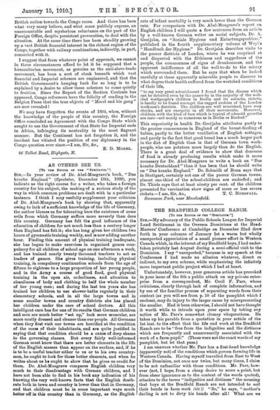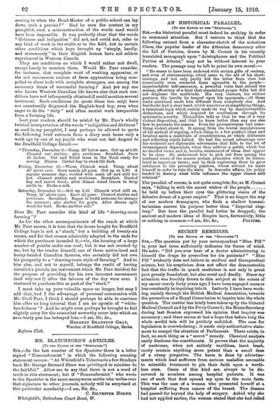THE BRADFIELD COLLEGE RANCH. pro TH.I EDITOR or TICE "
SPZETATOS.1
SIR,—My advocacy of the Public Schools League for Imperial Land Settlement in the Oversee Dominions at the Head- Masters' Conference at Cambridge on December 22nd drew forth in your columns of January 1st a warm but wholly unexpected appreciation of a small pioneer effort in Western Canada which, in the interest of my Bradfield boys, I had under- taken privately last August during a semi-official visit to the Dominion. I say " unexpected," because in my speech at the Conference I had made no allusion whatever, direct or indirect, to my own scheme, while emphasising the infinitely more important public project which I had at heart.
Unfortunately, however, your generous article has provoked in your issue of the 8th a public attack on my private enter- prise from a correspondent, Mr. Cecil F. Parr, whose criticisms, clearly through lack of complete information, and by use of the familiar process of separating words from their context (as you will see from p. 10 of the pamphlet which I enclose), may do injury to the larger cause by misrepresenting the smaller Had it been otherwise, I should not have thought it worth while to intrude upon your space by taking any notice of Mr. Parr's somewhat clumsy vituperations. He takes up his parable from a quotation in your article of the 1st inst. to the effect that the life and work at the Bradfield Ranch are to be "free from the indignities and the dirtiness which are frequently and unnecessarily associated with the work of a farm-pupil." (These were not the exact words of my pamphlet, but let that pass.)
I am unaware whether Mr. Parr has a first-hand knowledge (apparently not) of the conditions which govern farming life in Western Canada. Having myself travelled from East to West of the Dominion, not once nor twice, but many times, I claim to be not unfamiliar with those conditions. Mr. Parr, how- ever (not, I hope, from a cheap desire to score a point, but from sheer ignorance as to the context of the words quoted), attaches to the terms "indignities and dirtiness" the meaning that boys at the Bradfield Ranch are not intended to soil their hands in farm work (sic) "So," he says, "mother's darling is not to dirty his hands after all! What are, we
coming to when the Head-Master of a public school can lay down such a proviso P" Had he seen the context in my pamphlet, such a misconstruction of the words used would have been impossible. It was perfectly clear that the words " dirtiness and indignities " did not, and could not, refer to any kind of work in the stable or in the field, but to certain other conditions which boys brought up "simply, hardly, and strenuously " in their English homes have not seldom experienced in Western Canada.
They are conditions on which I would rather not dwell, except barely to mention them. Would Mr. Parr consider, for instance, that complete want of washing apparatus, or the not uncommon custom of farm apprentices being com- pelled to share beds with complete strangers, are among the necessary items of successful farming ? And yet any one who knows Western Canadian life knows also that such con- ditions have not infrequently obtained (I could mention several instances). Such conditions (to quote these two only) have not unnaturally disgusted the English-bred boy, even when eager to do the " dirty " and often menial work inseparable from a farming life.
Lest your readers should be misled by Mr. Parr's wholly twisted interpretation of the words " indignities and dirtiness " as used in my pamphlet, I may perhaps be allowed to quote the following brief extracts from a diary sent home only a week ago by one of my pupils who went out last August to the Bradfield College Ranch:— "Thursday, December 9.—Temp. 20° below zero. Got up at 5.30. Cleaned out stables : also cowhonse. Breakfast. Snow 10 inches. Cut and felled trees in the Bush ready for sowing. Dinner. Carted hay to stock till dark.
Friday, December 10.—Warm Chinook wind. Temp. about 40' above zero. Snow nearly all gone. Got up at 5.30. A regular summer day; worked with coats off and still too hot. Cleaned stables and cowhouse. Breakfast. Hauled hay and sawed wood ; after dinner wired fences to keep cattle in. Broke a colt.
Saturday, December 11.—Got np 5.15. Chinook wind still on. Temp. 45° above zero. Snow all gone. Cleaned stables and cowhouse. Breakfast. Began to build icehouse for storage for summer ; also shelter for goats. After dinner split wood for fuel. Broke another colt."
Does Mr. Parr consider this kind of life "drawing-room farming " ?
As for the other accompaniments of the ranch at which Mr. Parr sneers, it is true that the house bought for Bradfield College boys is not a " shack," but a building of twenty-six rooms, and for that reason admirably adapted to the ends for which the purchaser intended it,—viz., the housing of a large number of youths under one roof; but it was not erected by me, but by the vendor himself, one of those native-bred and horny-banded Canadian farmers, who certainly did not owe his prosperity to a "drawing-room style of farming." And to him also, and not to myself, belongs the credit of having installed a pianola (an instrument which Mr. Parr derides) for
the purpose of providing for his own innocent amusement (and why not ?) after the labours of the day were over. I ventured to purchase this as part of the " stock."
I must take up your valuable space no longer, but may I add that, had I the advantage of personal communion with Mr. Cecil Parr, I think I should perhaps be able to convince him after no long interval that I am no apostle of "white- handedness " ? And he might even perhaps be brought to feel slightly sorry for the somewhat unworthy sneer into which an over-hasty pen has betrayed him.—I am, Sir, &c.,
HERBERT HRANSTON GRAY,
Warden of Bradfield College, Berke.
Reform Club.







































 Previous page
Previous page